Introduction
Understanding Asperger Autism and advocating for children with Asperger's Syndrome requires knowledge, support, and strategic action. This article provides guidance and resources for Parent Advocates navigating the challenges of raising a child with Asperger's. From understanding the nuances of ASD to building a support network, developing advocacy skills, and navigating the education system, this article empowers parents to ensure the well-being and success of their children.
It also explores strategies for managing social situations, improving communication skills, setting realistic expectations, encouraging social interaction, managing meltdowns and behaviors, and embracing and celebrating their child's unique qualities. By delving into these topics, Parent Advocates can gain valuable insights and tools to navigate the journey with confidence and empower their children to thrive.
Understanding Asperger Autism
Autism Spectrum Disorder (ASD) encompasses a broad range of conditions that may affect individuals differently, influencing behavior, social skills, and communication. While some may have a deep understanding of how ASD impacts a person's life, this knowledge is not universally shared by those who may interact with individuals with ASD, such as friends, teachers, or co-workers.
Understanding the complexities of ASD, including what was historically known as Asperger's Disorder, is crucial for providing support to those impacted. The term 'high functioning autism' was used to describe individuals with milder symptoms and higher intellectual abilities, although this is not an official medical diagnosis. They may exhibit fewer difficulties with speech and communication but still face challenges in social interactions and may have sensory sensitivities or exhibit repetitive behaviors.
The historical context of the syndrome commonly known as Asperger's is complex. Dr. Hans, who gave his name to the syndrome, was involved in the tragic Kinder-Euthanasie program during the Nazi era. This has led to ethical considerations about eponyms in medical terminology, prompting some in the medical community to advocate for non-eponymous alternative names that do not carry such historical baggage.
Moreover, the movement toward non-eponymous naming acknowledges the contributions of diverse individuals who may not have been recognized due to the power structures of their time. This shift reflects a broader commitment to diversity and inclusivity in recognizing medical discoveries and conditions.
As we continue to understand and support individuals with ASD, it is important to recognize the full spectrum of the condition, appreciate the diversity of experiences among those affected, and embrace a more inclusive narrative that acknowledges the contributions of a wider range of scientists and researchers.
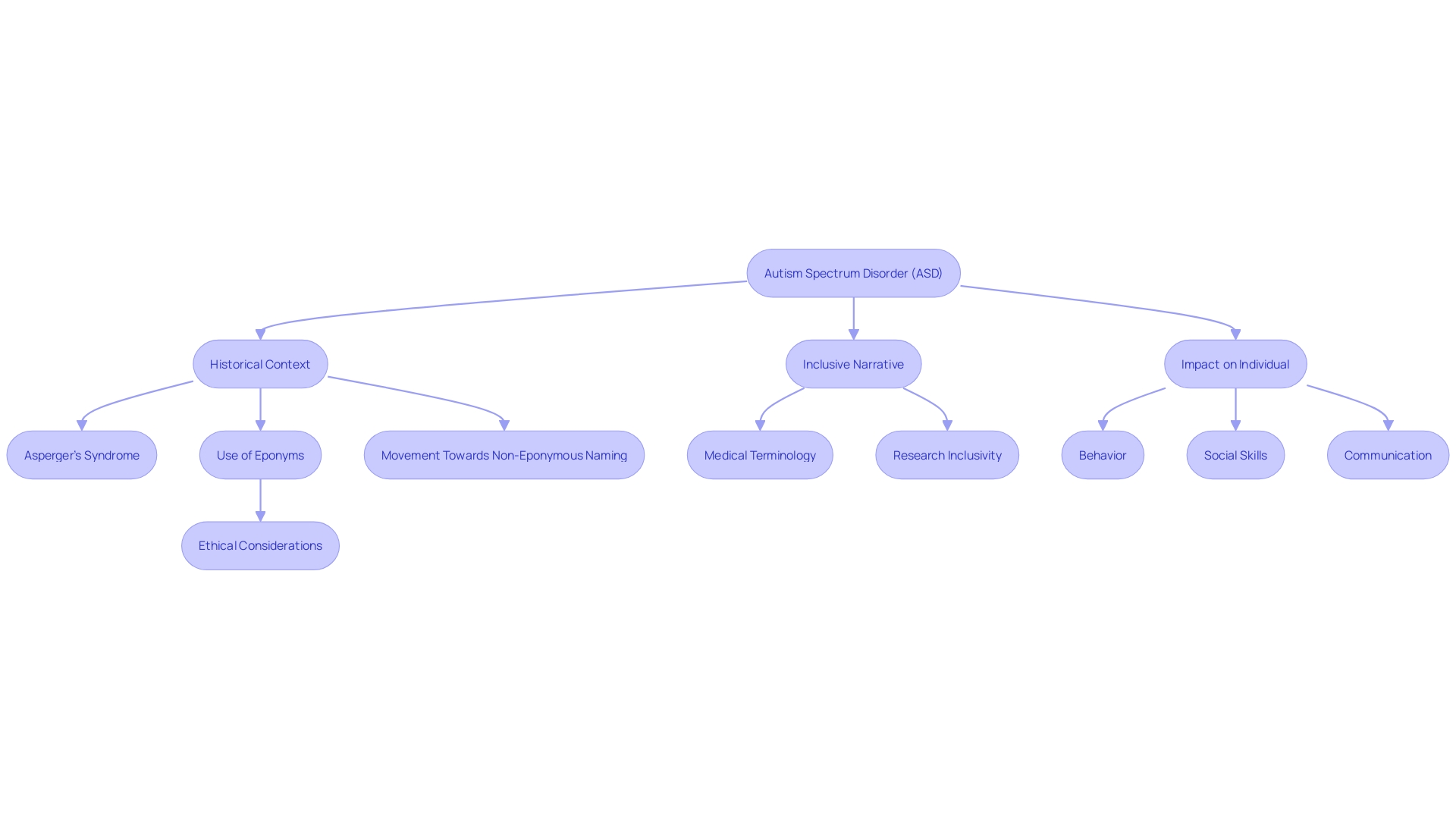
Strategies for Parent Advocates
Advocating for an individual with Asperger's Syndrome requires a blend of passion and practical executive functioning skills—planning, organizing, prioritizing, and executing tasks. This method assists parents in establishing a nurturing atmosphere that fosters equal opportunities for their offspring to excel academically, socially, and emotionally. A psychiatrist specializing in children, Dr. David (Dan) R. Offord, emphasized the importance of fostering a fair and supportive race for children with disabilities, ensuring they receive the resources needed to flourish.
Staying informed is a key strategy in advocating for your offspring. With continual medical advancements and new therapeutic approaches, it's vital to stay up-to-date. Assessing the benefits and risks of medications, understanding treatment options, and maintaining a pulse on the latest research empowers caregivers to make informed decisions. It is essential to verify findings with experts, discern credible sources, and remain cautious of alluring yet potentially harmful alternative treatments found online.
In light of recent revelations about Dr. Hans' involvement with Kinder-Euthanasie, there is a growing call for the medical community to reflect on the eponyms used for diagnoses. Pediatric Research has taken a stance to expunge his name from their publications and advocate for non-eponymous names that honor the diverse contributions to medical science.
For proponents, these advancements highlight the importance of ongoing education and moral attentiveness in aiding individuals with Asperger's condition. By combining heartfelt passion with informed, strategic action, parents can ensure their advocacy leads to meaningful progress in making society more inclusive and supportive for their offspring.
Building a Support Network
Developing a strong network is essential when navigating the intricacies of Asperger's Syndrome within a family. Engaging with a network of parents, experts, and specialized groups provides a platform for exchanging stories, acquiring valuable knowledge, and receiving emotional backing. Accessing these networks can reduce feelings of isolation and provide you with practical methods to assist your child's individual experience. Staying informed about the latest research, treatments, and educational approaches is also vital. It requires ongoing commitment to research, discerning credible sources, and consulting with professionals about the implications of new information on your offspring's care. Since the welfare of youngsters with Asperger's is significantly influenced by their social involvement and the assistance of their caretakers, creating and fostering a strong support system is not just advantageous—it's a stride towards guaranteeing fairness and mental well-being for your offspring.
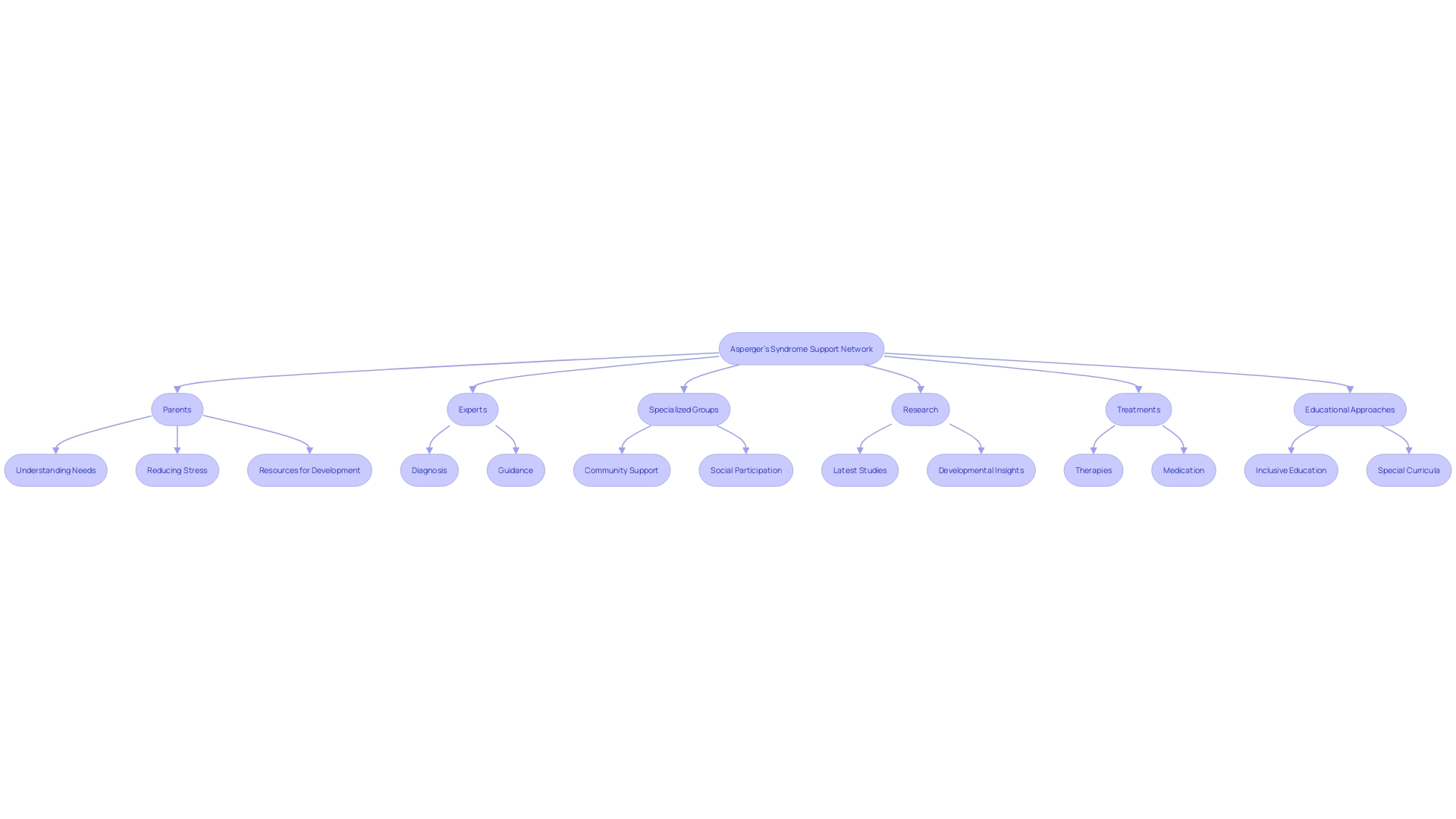
Developing Advocacy Skills
To support the requirements of an individual with Asperger's Syndrome, one's advocacy skills must be as flexible and diverse as the condition itself. Embracing the dynamic realm of treatments, therapies, and educational strategies is essential in effectively supporting your offspring. With new findings constantly emerging, staying informed is not just beneficial—it's imperative. By delving into the latest treatments and approaches, and critically evaluating the benefits and risks of each, you can become an informed advocate who knows when to embrace new methods and when to steer clear of unproven alternatives.
Cultivating advocacy skills also involves sharpening one's executive functions, which include planning, organizing, and strategizing. These cognitive tools are priceless when maneuvering through the intricate terrain of Asperger's guidance. Whether it's ensuring compatibility in learning environments or engaging in meaningful dialogue with educators and therapists, the ability to articulate and negotiate your offspring's needs is paramount. Additionally, having a deep understanding of the intricacies of Asperger's Disorder enables you to recognize and connect different resources and support networks that can improve the growth of your offspring.
Statistics reveal that autistic individuals face distinct challenges, including employment disparities and a significant pay gap. Recognizing these societal obstacles highlights the significance of support, not only in individual environments but also in wider circumstances that impact your offspring's future. By honing your advocacy skills, you become a force for change, ensuring that every opportunity for growth and integration is seized and that the narrative around neurodiversity is shaped by knowledge and compassion.
Navigating the Education System
Starting the educational journey with a youngster who has Asperger's Syndrome can appear challenging, but with the correct knowledge and resources, parents can become skilled navigators of this terrain. Understanding the educational rights of your offspring is crucial, as they are protected by the Individuals with Disabilities Education Act (IDEA). Idea's mainstay is to equip students for post-high school life, including further education and employment, by ensuring access to necessary accommodations and services.
In pursuit of an ideal learning environment, some parents choose homeschooling to tailor educational experiences to their offspring's unique needs. However, for those engaging with public or private schooling, early childhood intervention and Individualized Family Service Plans (IFSPs) are critical, especially since most individuals with autism exhibit developmental signs before age four. Understanding these plans enables parents to collaborate effectively with educators and advocate for their son or daughter's inclusion in the school community.
Amidst the complexities of the education system, it remains crucial for parents to stay informed about the latest in autism research, treatments, and educational strategies. As one parent observed, 'Navigating Autism: The Early Years has given me not only a comprehensive understanding of autism, but also an insight into children's behaviors across the board.'
Indeed, the journey is ongoing, and as one specialist emphasized, 'For many generations, there has never been a more crucial moment than this – how we can create an education system that welcomes young individuals.' With knowledge, assistance, and a group of educators and advocates, parents can ensure their child with Asperger's thrives academically and beyond.
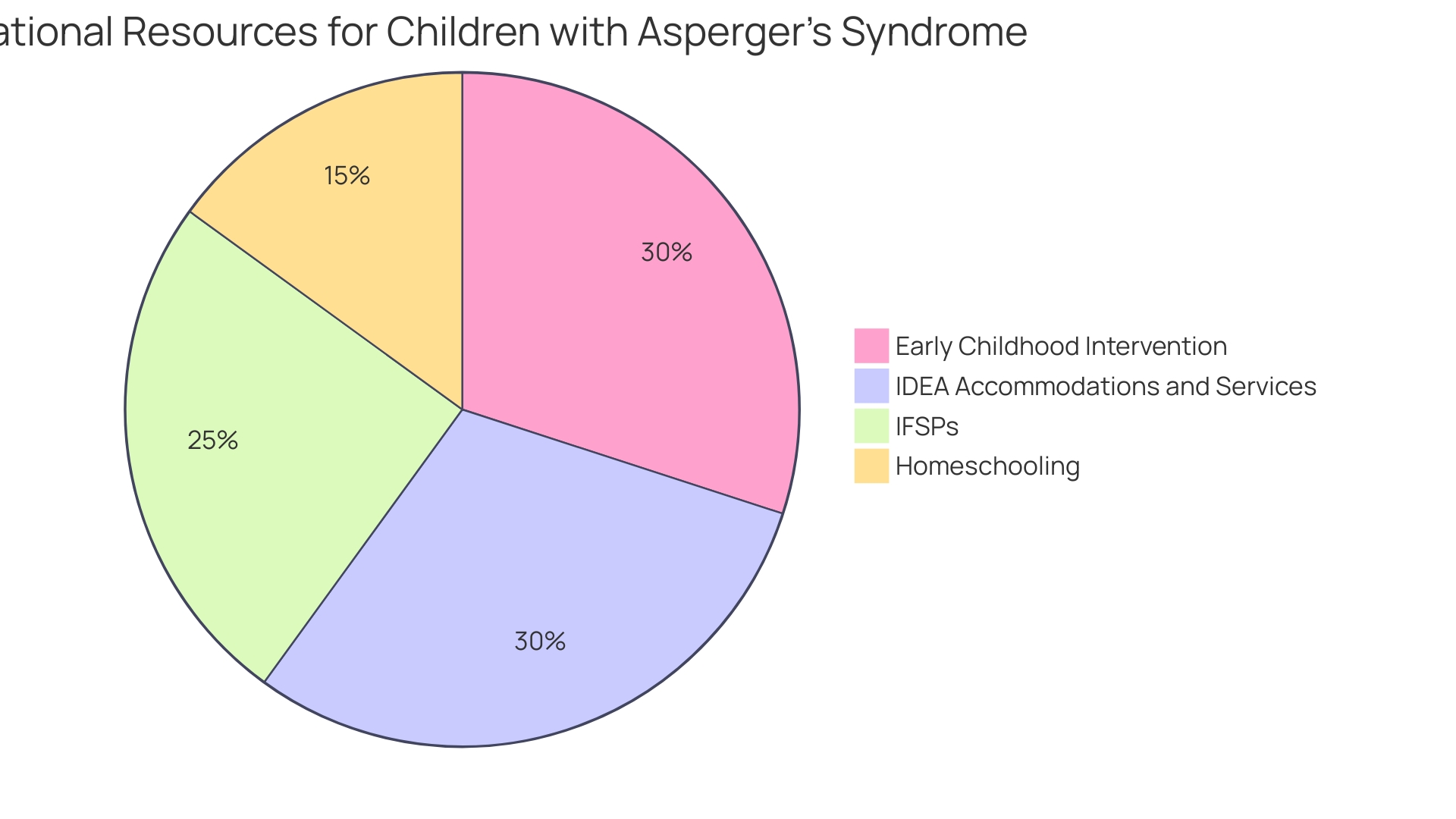
Managing Social Situations
Navigating social situations can be particularly challenging for individuals with Asperger's Syndrome, as they frequently encounter social interactions differently. It is crucial to comprehend that every person with Asperger's has distinct characteristics and needs individualized assistance. By embracing this individuality, parents and caregivers can provide tailored strategies to help their child improve social skills and form meaningful relationships.
One effective approach is to foster interpersonal intelligence, which is the ability to understand and interact effectively with others. This intelligence type encompasses skills like active listening, empathy, and the capacity to connect on a deeper level. Enhancing interpersonal intelligence can be transformative, enabling individuals to engage more confidently and comfortably with peers.
In addition to embracing individualized support, it's useful to recognize the adaptive techniques many autistic individuals employ to 'fit in' with their surroundings. These compensation strategies highlight the extraordinary resilience and resourcefulness of those with a unique neurodivergent condition, as they navigate a world that often doesn't cater to their natural way of being.
By prioritizing these approaches and recognizing the unique encounters of every individual with Asperger's, guardians and caregivers can enable their offspring to flourish in interpersonal circumstances and establish enduring, genuine relationships.
Creating Structure and Routine
Creating a well-rounded and supportive atmosphere is essential for individuals with Asperger's Syndrome. It's about finding a harmonious blend of warmth and structure to foster a sense of stability and reassurance. By nurturing an authoritative parenting approach, we establish a framework within which our offspring can flourish. This involves crafting clear routines, setting understandable expectations, and building a nurturing home atmosphere. Such a stable environment can help mitigate stress and anxiety, paving the way for happier, more secure children.
For instance, consider Lil, a 17-year-old from Southampton, UK, who faced the daunting transition from a special school to a community-based setting. The uncertainty of new routines and expectations posed a significant hurdle. Yet, through careful planning and the support of structured programs like those at Friends of St James Park, Lil could navigate this transition more smoothly. These programs underscored the importance of an environment that recognizes the unique needs and strengths of individuals with Asperger's, supporting their development and easing the stress of change.
Dr. David (Dan) R. Offord's perspective that a fair race for young individuals includes 'engaged, peaceful and well-supported participation' aligns with this approach. A structured routine is not just about order; it's about equity, providing a fair chance for every individual to succeed and reducing the chronic stress that can impede mental health.
In the classroom, the implementation of simple, clear routines can have a transformative impact on behavior and learning. As Jon Tait and Doug Lemov articulate, such routines cater to our inherent desire for predictability and can significantly enhance efficiency and effectiveness. By taking cues from educational settings, parents can apply similar principles at home, ensuring that their offspring's day-to-day experiences are consistent and reassuring.
It's essential to recognize that while our offspring's needs may be complex, the solutions can often be found in the simplicity of routine and structure. By setting small, achievable goals and celebrating the small victories along the way, we not only support our offspring's growth but also nurture their mental health and sense of belonging.
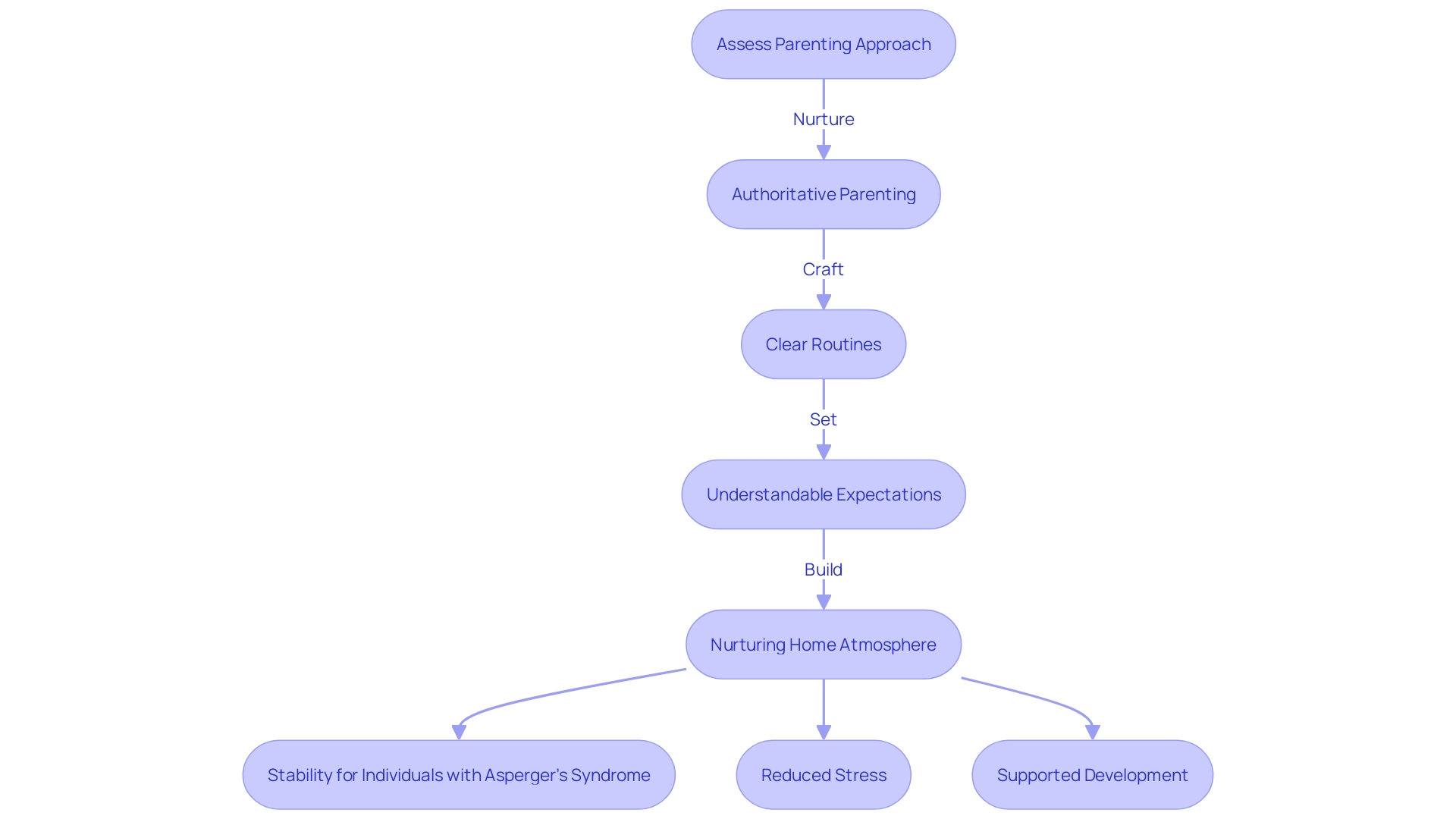
Improving Communication Skills
Advocates for parents play a crucial role in supporting individuals with Asperger's Syndrome, and effective communication is an essential tool in this journey. For certain individuals, such as 17-year-old Lil transitioning from special school to a new environment, changes can be overwhelming due to unfamiliar settings and routines. To aid in such transitions, integrating digital storytelling has proven advantageous in alleviating uncertainty and enhancing comprehension for children with autism.
Elizabeth Bonker's initiative, Communication 4 ALL, highlights the importance of equipping nonspeaking autistic individuals with tools to express themselves, hence improving their ability to connect with the world around them. The organization's mission underscores advocacy and empowerment, emphasizing that every nonspeaker with autism deserves the opportunity to be heard and educated.
In fostering communication, it's essential to engage in emotionally intelligent conversations, which involve a blend of verbal and nonverbal skills. This requires being in tune with one's own emotions as well as those of others, making reasonable requests to meet needs, and listening attentively while remaining open-minded. Achieving such a level of communication guarantees that all individuals, including children with disabilities, have their needs fulfilled and their potential acknowledged.
Furthermore, the art of effective communication extends to various channels, and selecting the right one based on the message's nature is crucial. For instance, face-to-face interactions can be more suitable for complex discussions, where nonverbal cues like body language and facial expressions add depth to the conversation.
Statistics support the need for evidence-based practices and resources that promote the well-being of individuals with disabilities, indicating that participation in school and community life is fundamental to their mental health and equitable treatment in society. Dr. David (Dan) R. Offord's profound words remind us that ensuring equal opportunities for our offspring involves recognizing their unmet needs, reducing stress, and providing caregivers with adequate resources.
In the end, improving communication with youngsters who have Asperger's condition can establish a connection to comprehending their reality and cultivating their development, opening the door for a more comprehensive and helpful society.
Setting Realistic Expectations
When supporting an individual with a diagnosis of Asperger's Syndrome, it is essential to acknowledge their uniqueness, embracing both their abilities and the difficulties they encounter. This means cultivating an environment where expectations are tailored to their unique capabilities, allowing them to thrive and achieve at their own pace. Acknowledging every achievement, regardless of its size, can have a positive impact on their mental well-being, creating a fair and supportive environment where individuals with Asperger's feel appreciated and encouraged.
For instance, consider the story of Lil, a 17-year-old transitioning from a special school to a new community-based setting, such as Friends of St James Park in Southampton. This transition period was made smoother by understanding the uncertainties that come with change for autistic individuals, and by setting clear, achievable goals. Similarly, Bella, who shares her insights throughout this article, emphasizes the importance of setting house rules and boundaries, demonstrating that structure can provide the much-needed stability for young people.
We must stay informed about new findings, treatments, and interventions while being cautious of unproven therapies. As caregivers, understanding and managing medications, and being mindful of the information we consume, is paramount. Downloading resources like our FREE guide on Autism can be an initial step in fostering a positive perception of autism within our families.
As Dr. David (Dan) R. Offord once said, "Growing up in Canada is like a race. I do not mind if my offspring are in a race as long as the race is fair This emphasizes the significance of establishing an 'equitable competition' for individuals with disabilities, by recognizing their requirements, alleviating stressors, and offering the assistance essential for their overall well-being and that of their families.
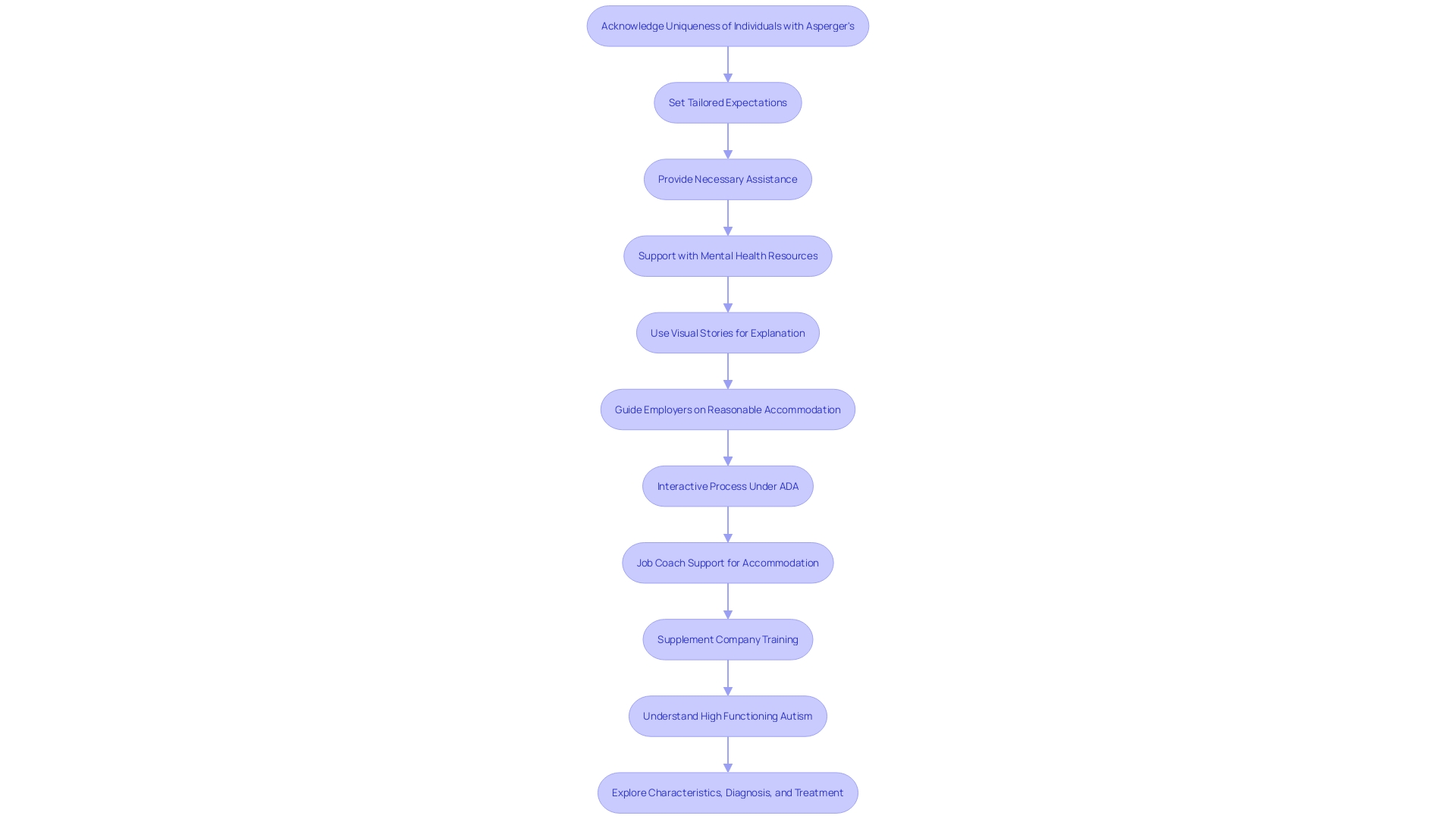
Encouraging Social Interaction
Fostering social interaction in kids diagnosed with Asperger's Syndrome is essential to their development and can open doors to enhanced communication and enduring friendships. To help your little one in enhancing their social skills, think about organizing playdates, enrolling them in social skills groups, and participating in community activities such as those offered by Friends of St James Park. This Southampton-based organization offers a community cafe and opportunities for skill development, networking, and volunteering through their Community Club and Gardening Group, providing a supportive environment for social growth.
Dr. David (Dan) R. Offord, a renowned psychiatrist specializing in children, emphasized the importance of inclusive participation for individuals with disabilities, stating that it's crucial for their mental health and equity in society. Similarly, it's crucial to approach autism with a positive mindset, ensuring your offspring understands that their diagnosis is not a negative aspect of their identity. Developing a positive storyline about autism can help children avoid internalizing any stigma and foster a positive self-image.
Furthermore, consider guiding your offspring through social scenarios using structured approaches, like creating a digital story to help with transitions, which can be particularly challenging for those with autism due to the uncertainty of new environments. By adhering to a structure that outlines anticipated behaviors and clarifies the rationales behind them, you can establish clear expectations and assist your offspring in navigating social interactions more comfortably.
Keep in mind that social and emotional skills are increasingly recognized as vital for students, according to studies from the OECD Directorate for Education. Hence, nurturing these abilities in youngsters with Asperger's Condition is not just advantageous for their individual growth but also adds to their upcoming achievement and welfare. Supporting your offspring's social endeavors and equipping them with the appropriate tools and environments can have a substantial impact on their social journey.
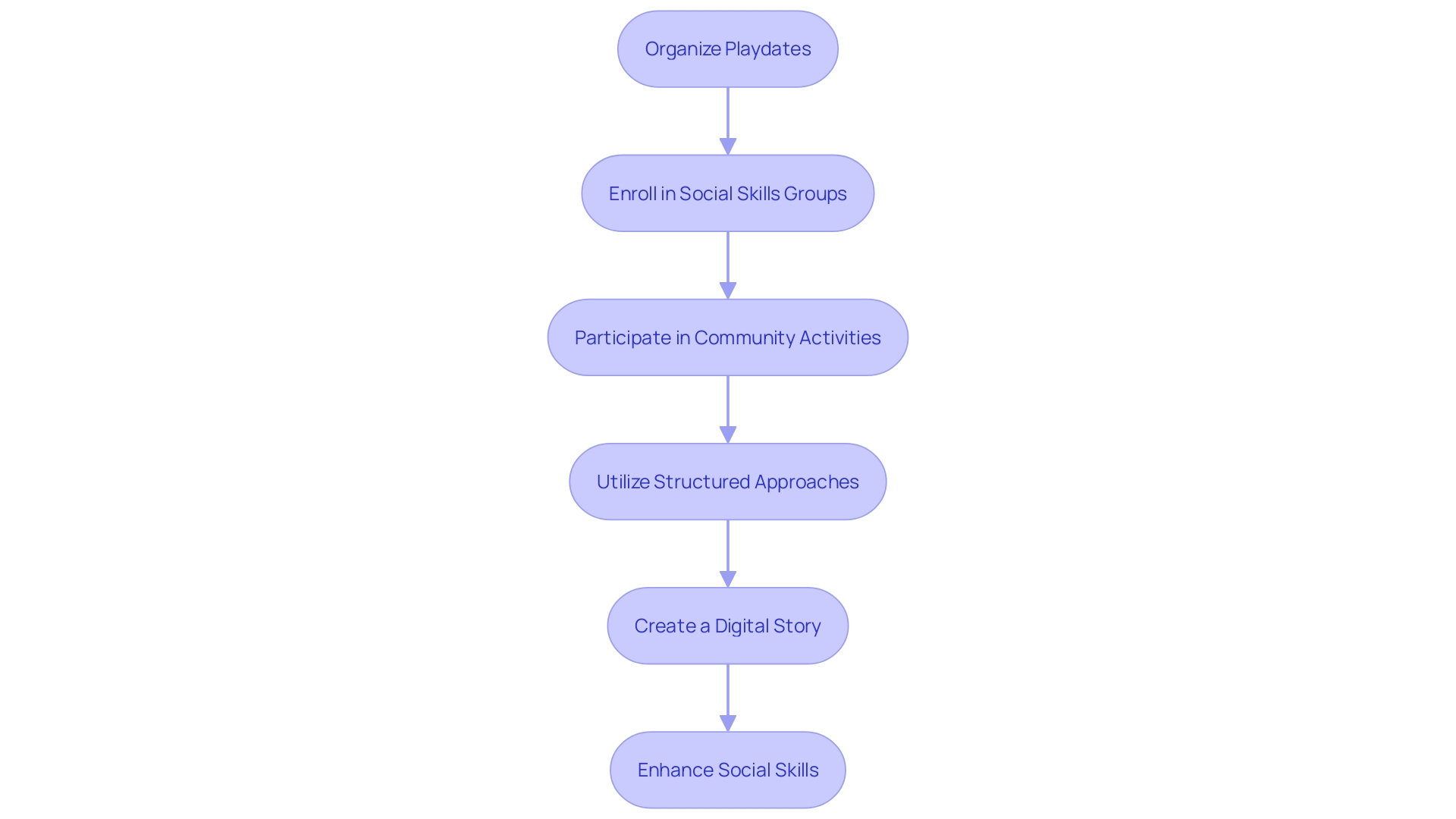
Managing Meltdowns and Behaviors
Dealing with the intricacies of a certain syndrome can be especially difficult during periods of increased stress or meltdowns. It is crucial for those who provide assistance to individuals with Asperger's to identify the indications of anxiety and emotional distress, which can appear distinctively in young ones and teenagers. Professionals note that anxiety disorders are one of the most common mental health problems affecting at least 10% of individuals under the age of 18 at any given time. During times of transition, such as moving from a special school to a new community setting like Friends of St James Park, the unfamiliarity can heighten stress for those with Asperger's Syndrome.
Creating a supportive environment is key to managing these intense emotions. It's important to acknowledge the young one's feelings, as simple affirmations like 'You seem really frustrated or angry right now, is that right?' can make a significant difference. This approach is effective across all age groups, from toddlers to adults, helping the individual feel safe and understood. Once this emotional safety is established, it becomes possible to collaboratively work on problem-solving and developing coping strategies.
Understanding the triggers that lead to stress behavior is crucial. Reflecting on the young individual's strengths can empower them to harness these abilities in future challenging situations. Moreover, taking into account the assistance that the young one may require to experience a sense of safety can avoid the reappearance of overpowering feelings. For instance, a single mother emphasizes the daily challenges of ensuring safety and completing tasks while managing family stress. By focusing on these aspects, parents and caregivers can help their offspring learn to navigate their emotions and develop resilience.
Autism Spectrum Disorder (ASD) affects people in different ways and requires personalized support throughout a person's life. While individuals with ASD may share certain characteristics, it's important to remember that each person's experience is unique. Statistics reveal that while ASD prevalence is relatively consistent across demographics, girls are diagnosed less frequently than boys. Furthermore, cognitive abilities among those with ASD vary widely, highlighting the need for tailored interventions.
To sum up, effectively supporting an individual with Asperger's Disorder through meltdowns and challenging behaviors involves creating a calm setting, utilizing visual aids, recognizing emotions, and implementing behavior management strategies. By understanding the needs of a young individual and working together to build coping strategies, we can help them navigate their emotions and improve their overall well-being.
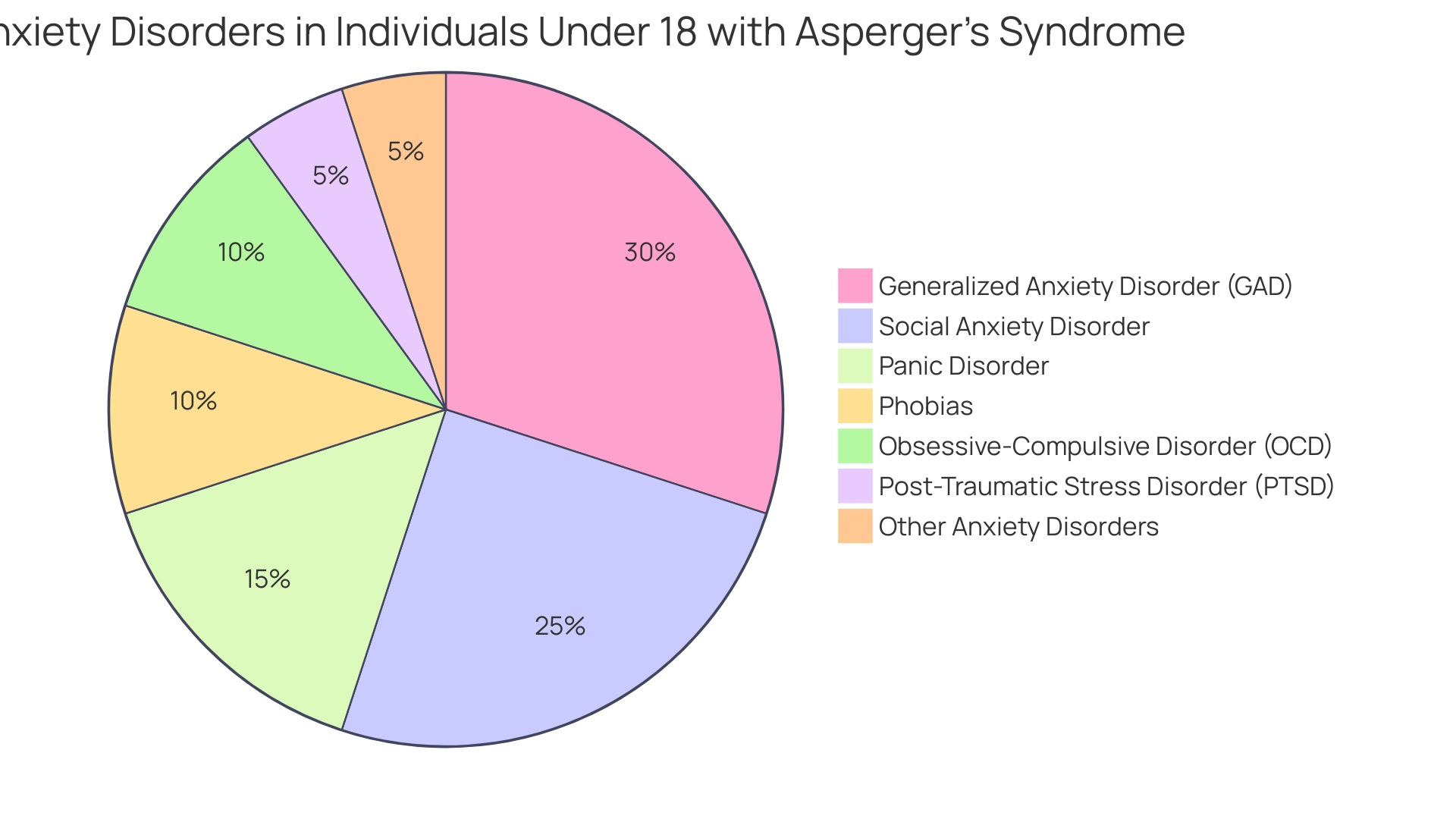
Embracing and Celebrating Your Child's Unique Qualities
Each individual with Asperger's Syndrome brings a unique set of qualities and strengths to the world. Recognizing and celebrating the unique abilities and passions of your offspring is crucial for fostering the self-worth and perseverance. When we focus on the positive attributes, we create a nurturing environment that fosters a strong sense of self-identity. Take James for example, who found solace and expression in art amidst challenges at school, or Humza, an 11-year-old whose passion for aviation led to a memorable experience with Emirates airline. These stories demonstrate the incredible potential within every individual when their interests are recognized and supported.
Educational settings like the Evelyn Scott School embody this philosophy by prioritizing personalized learning that taps into each student's curiosities. Similarly, programs like the one at Friends of St James Park offer community engagement and skill-building opportunities that can be especially beneficial during transitional phases for autistic youth. By staying informed about new findings and treatments, as emphasized by the Children's Defense Fund's report, caregivers can support their offspring's well-being while fostering a community that appreciates the inspirational aspects of autism, as voiced by Dennis Kimbro. Embracing our children's individuality not only benefits them but also enriches our families, communities, and society at large.
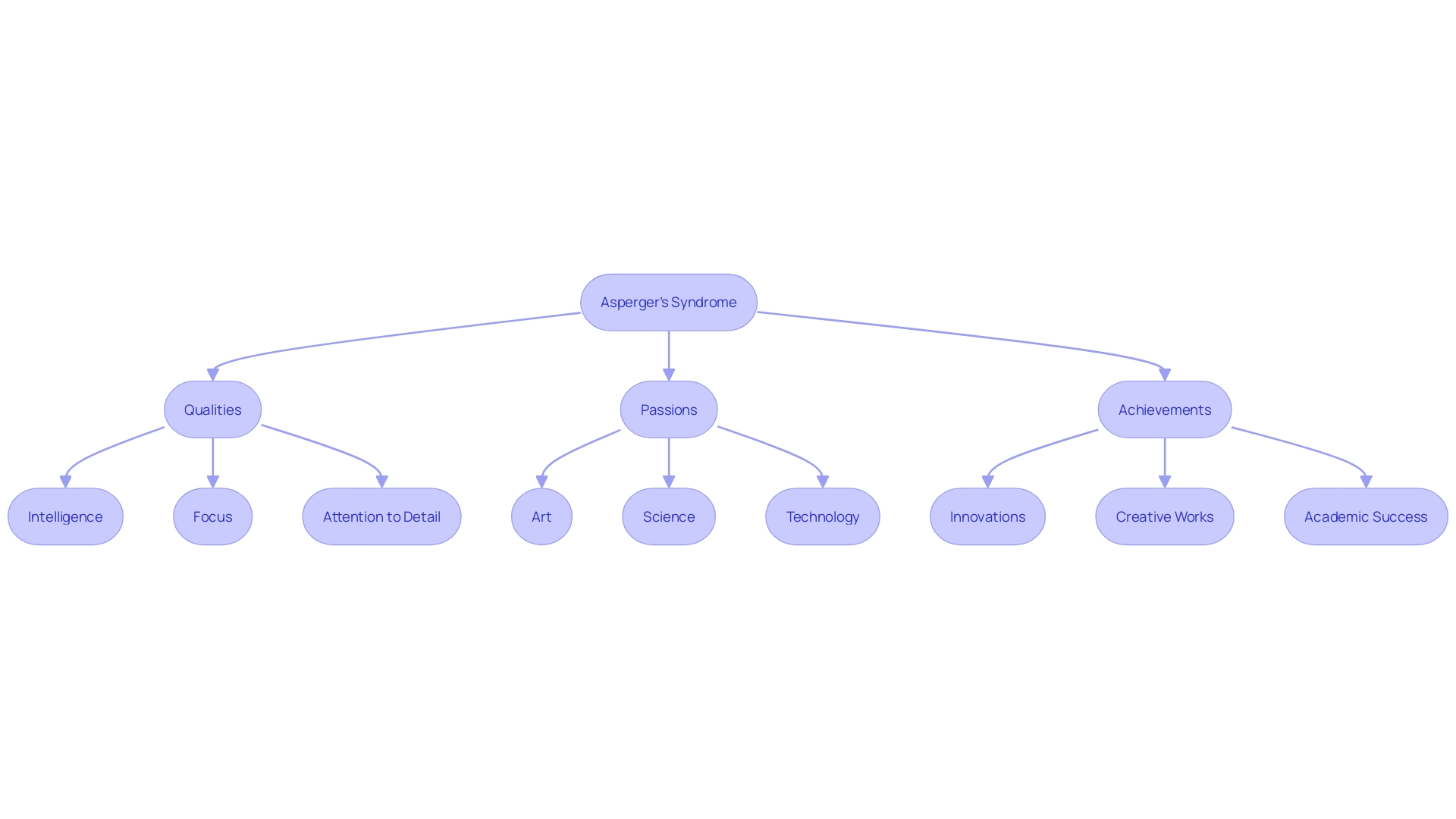
Conclusion
In conclusion, advocating for children with Asperger's Syndrome requires knowledge, support, and strategic action. By understanding ASD and building a support network, Parent Advocates can navigate the journey with confidence and empower their children to thrive academically, socially, and emotionally.
Developing advocacy skills is essential in championing the needs of a child with Asperger's Syndrome. By staying informed, navigating the education system, and embracing new strategies, parents can ensure their child's well-being and success in school.
Managing social situations and improving communication skills are key. By embracing individualized support, fostering interpersonal intelligence, and using structured approaches, parents can help their children navigate social interactions, form meaningful relationships, and communicate effectively.
Creating structure and routine is crucial. By establishing a balanced and nurturing environment with clear expectations and routines, parents can reduce stress and anxiety, creating a stable foundation for their children's growth and development.
Setting realistic expectations involves recognizing and celebrating their child's individuality. By tailoring expectations, celebrating milestones, and focusing on their strengths, parents can foster a positive self-concept and create a nurturing space where their children feel valued and supported.
Encouraging social interaction and managing meltdowns and behaviors are important aspects. By providing a supportive environment, understanding triggers, and implementing behavior management techniques, parents can help their children navigate their emotions and develop resilience.
Finally, embracing and celebrating their child's unique qualities is essential. By recognizing and encouraging their talents and interests, parents can nurture their self-esteem and foster a strong sense of self-identity.
By implementing these strategies, Parent Advocates can ensure the well-being and success of their children with Asperger's Syndrome, helping them thrive and reach their full potential.




